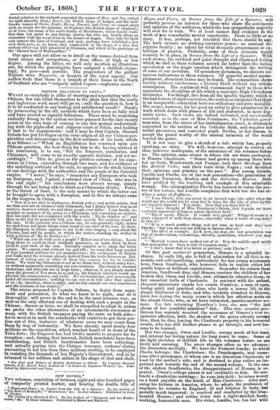BRITISH RELATIONS IN ' WEARY as everybody is alike of
'warring and negociating with the -Chinese, few can blind themselves to theplain fact that the costly and inglorious work must Still -go on ; only the question is, how is it Ville conducted to any lasting and -satisfactory. result? Hardly by persevering in the old Methods which have been so fully tried and have proved so signally fallacious: There must be something radically 'wrong in the system we have pursued for the last twenty ears in the vans hope of coming to any fair mutual understand- ing with the pigheaded and - slippery court of Pekin and holding it fast to its engagements ; and it may be that Captain Sherard Osborn has put his finger on the very-origin of all our Chinese per- isle...Jr:hies and miscarriages in the first sentence of his book; which ae-follews:—"When an Englishniao has reasoned- -upon any Chinese question, the best thing for him to de,-- having arrived at his conelusion, is to say, But the-Einperer, 'mandarins, and Chinamen, will come to an-exactly opposite decision, and act ac- cordingly.' This he gives aS the- positive outcome of his expe- rience in China, extending theotigh two Wars, and for evidence of the unfailing certainty of the rule, he appeals to the whole history of our dealings with the authorities and the people Of the Celestial empire. "I never," he says, "remember anyEnropean who took in European, and, I giant, tt 'rational view of China; who was in the -end 'right ;" his conclusions were always wrong, simply through his not being able to think as a Chinaman thinks. Force, or the 'threat -of force, is- the only means by which the latter can be brought to agree with a European, and to this'we always come irf the longrun in China. • ' ":Now it is not only-in diplomacy, foreign policy, and public points, that 'we thus ever are at variancemith Chinamen, but I firmly believe that in all matters, however trivial, we and these people ever differ. I can hardly re- member an instance of my going to a Chinaman, and, expressing, an opinion, that his reply Aid not conainence with the Weida,: My no thinkee SQ and then ott his wayhe generally told you that exactly the contrary would be the ease. If the question was a Chinese one, he was generally right; unless we used force and made things come rbund to our view of the ease. In short, the European 'in China appears to me to be ever singing a song about the Flowery land and its people, to which the native, .stimding by, strikes in With a chorus of 'My no thinkee so . . "What can you do with such 5 people ? Either one of two things. Leave them alone to exult in their obstinate ignorance, or make them by force yield to your view of the case: Necessity compels* us to adopt the latter course. "We cannot exist without .tea and silk; we want that huge market of four hundred millione for our manufactures; thb exchequers of Britain and India need the revenue already derived from the trade between us. But, instead of taking one or other of these two courses, we try to combine them. We Want the Chinamen' to act: as ire think best, without using force, or without apparently consulting our own interests. The resuitia constant bickerings, and ultimate use of large force ; whereas, if you amply started upon the ground of You must do so and so, the Chinese intellect ,would ap- preciate the consequences, and .yielit 71-e aro barbarians, and unreasonable under.all circumstances nothing we can say or do will alter that opinion of us ; do, therefore, what is right, and merely consult our own consciences and the interests of our country."
_ The course proposed by Captain Osborn, to desist from argu- ment and persuasion, do what we know to be right, and do it thoroughly, will prove in the end to be the most humane way, -as well as the only- effectual one of dealing with such a people as the Chinese. Sooner or. later, we shall be compelled to adopt it, unless we prefer the- Other alternative of an- interminable succession- of wars, with the British taxpayer paying the costs on both sides-; for in meal or in malt the mandarins-will contrive to get theirlier- tion out of him, inclusive of whatever sums we may exact from them by way of indemnity. We have already- spent nearly four millions on the expedition, which was last heard of in front of the Taku forts ; the Emperor has had twelve months to prepare for its reception; and, during that interval, British merchants have been contributing, and British functionaries have been collecting, and actually paying into the Chinese treasury, customs'-duties amounting to not less than three millions sterling, to be employed in resisting the demands of her Majesty's Government, and to be returned to her soldier's and sailors in the shape of shot and shell.
• The Past and Future of British Belationt China. By Captain Sherard Osborn, C.B., Royal Navy, Author of "A Cruise in Japanese Waters," &c. Pub- lished by Blackwood and Sons.


























 Previous page
Previous page